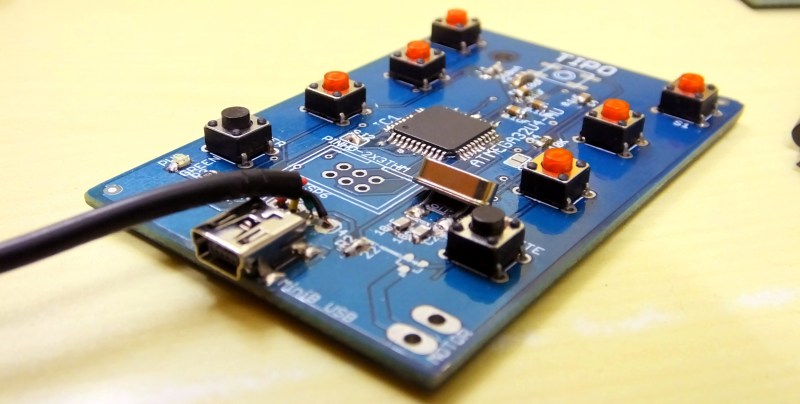A few things stand out about [Vijay]’s braille keypad for smartphones. One is how ergonomic the plans for the final result are, sitting on the back of the smartphone such that you hold the phone much as you often normally would. Another is that it plugs in just like any other USB keyboard. And the last should make any vi user smile — you don’t have to move your fingers to type. You just press combinations of buttons already under your fingers.
It consists of a custom circuit board with an AtMega32U4, a 16 MHz oscillator, a Micro-USB connector and eight pushbutton switches. The AtMega32U4 allows him to use the Arduino HID library. After mapping the braille button combinations to keys, the HID library sends the key values over a USB-OTG cable to the smartphone to be accepted as if they were coming from a normal plug and play keyboard.
We have to give kudos to [Vishay] for testing with blind people experienced with braille. For example, he’s learned that if the user presses [Dots 1 2] for ‘b’ followed by [Dots 1 4] for ‘c’, they prefer to not have to remove their finger from the 1 in between the two characters, for more rapid typing. He also learned that battery management is problematic and that may be why he’s since abandoned the option of communicating over Bluetooth, leaving just USB, and thereby eliminating the need for a battery.
[Vijay]’s project is a finalist for the Internet of Useful Things Hackaday Prize and we’re eager to see what the final result will look like. But in the meantime, check out his hackaday.io and GitHub pages, and see the video below of one iteration of his keypad in use.
Braille devices seem to show up in the Hackaday Prizes every year. For example, [haydn jones] entered a braille printing press, and last year [Madaeon] entered a modular braille display that used DIY mini-solenoids for raising and lowering the dots.




















I’ve been wanting a chording keyboard I can use with every computing device I commonly work with (including my phone) for quite some time. I’m not sure braille is the best chord map for this, but at least it’s a place to start. BTW, it’s very similar to: http://gkos.com/gkos/index-gkos-com.html (maybe support that chord map as an option?)
have you looked at the twiddler? Its bluetooth and usb. I think its 4 rows of things to get a decent chunk of options.
I wish twiddler came in a larger size option.
I never liked the Twiddler/Fiddler/Keydler system. To me, the whole point of a chorded keyer is not having to move your fingers off the keys. I like the GKOS/this project for that fact, but I also want it to be 1-handed, so I can use a pointing device at the same time. I think a “Microwriter”-style device, but as a grip instead of a flat, desk-oriented form-factor, is what would work for me.
I know exactly what you mean, I’ve been wanting something like that since I first tried asetniop in a browser. I’ve thought about making my own but never really had the will…
Nice work. I’m really excited to see the adaptive tech that hackaday’s prizes have encouraged.
I think Apple have a patent on a tactile screen that would serve as both display and input for braille. Not that this project in’t a great hack, I like the idea a lot and even though electrostatics would make for a thinner keypad the tactile nature of the buttons is probably important too.
I have admittedly controversial ideas on the subject of IP, but it seems that patenting yet not producing this technology is a clear dick move. They’ve already done a lot of the work, have the scale and experience to make it cheaply, and could make a lot of disabled people’s lives better. But they just patent and shelf it. As if out of spite or something.
Guess we wait for years and years until the patent runs out, like we do for a surprisingly huge percentage of technology. IP is such a mess. And it’s justified as ensuring that innovation is profitable for all those hard-working engineers and inventors and creators. Sounds reasonable; in reality it’s usually the opposite. Not to mention it just plain isn’t how ideas fundamentally work. Okay, this is becoming a general anti-IP rant, I’ll shut up now. My bad.
Oh that is fine go ahead and rant, yeah they are problematic, should be more freedom to use for disability support tech without licences etc.